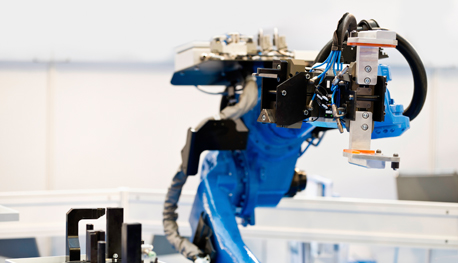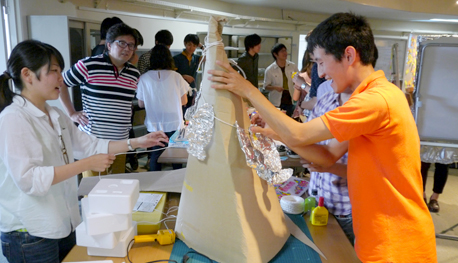Education
Systems and Control Engineering Undergraduate MajorCurriculum
Providing education and training that foster innovators of systems with new values
After receiving grounding in the basic sciences in their first year, students majoring in Systems and Control Engineering acquire specialized skills and knowledge in areas that are foundational to the discipline, namely mathematics, control, system representations, measurements, electronics, and mechanics. Integrative subjects, such as Mechatronics and Creative Systems, which integrate multiple areas of study, are also taught through a series of courses involving exercises. Iterative learning through these courses allows students to gain an understanding of both pure and applied aspects of Systems and Control Engineering. Furthermore, through Research Opportunity Courses, students utilize their knowledge of the discipline to create real functional systems, thereby developing their practical ability. It is also possible for students to build intercultural competence by taking part in international design contests.
-
1st Year
- 100-Level Courses
-
Students in their first year of undergraduate studies receive basic education that centers on Institute-wide compulsory courses regardless of their discipline. The 100-level courses are designed to teach common, basic skills that are required of science and technology students. The aims of these courses are to provide knowledge and cultivate versatile intellect necessary for studying at the Institute.
-
2nd Year
3rd Year- 200-Level and 300-Level Courses
-
Students who complete their 100-level courses advance to study their undergraduate major. Courses at the 200- and 300-levels specific to the Systems and Control Engineering Undergraduate Major are taken in accordance with the curriculum.
-
- Mathematics for Systems and Control
- Students study mathematical techniques that form the basis of system analysis. Through lectures and exercises, students acquire an understanding of linear algebra, differential equations, complex function theory, Laplace transform, and Fourier transform so that they may advance to mastering mathematical modeling that forms the backbone of cutting-edge systems science.
-
- Systems and Control
- These courses deal with control theory, the control of systems, and cover a wide range of material, from the basics to the application of control theory. Students begin their studies by learning what a state variable is, progress to the control of linear and nonlinear systems, and finally advance to system modeling and the control of real plants.
-
- Measurement
- The first step to take when something needs to be controlled is to take measurements. Students are first introduced to the basics, such as sampling theory and the handling of random signals. Then, ways of taking measurements using images and different types of waves, and systems for taking precise measurements are studied. Students also acquire knowledge of advanced sensing technologies.
-
- Mechanics for Systems and Control
- Important topics such as dynamics, heat, and fluids are studied using an analytical approach. Students begin by studying basic mechanical motion, and move on to the analyses of continua, heat, and vibration. In addition to mathematical modeling, course learning extends to computational dynamics as well as advanced topics related to living organisms and life.
-
- Electronics
- Through these courses, students acquire basic knowledge in electrical circuits, which are used to control many systems today. Furthermore, after getting practical experience through Creative Systems courses, students go on to study electromagnetic actuators.
-
- Mechatronics
- The term "mechatronics" was coined in Japan to refer to integrated systems made by blending mechanics and electronics. Robots are often the chosen subject in the Mechatronics courses, and ways of handling their kinematic and dynamic characteristics are studied. Students also acquire knowledge about cutting-edge mechatronics that are being used in the world.
-
- Creative Systems
- Building a real, functional system involves more than just desk work. Tokyo Tech is well known for using robot contests in its curriculum. In keeping with this practice, these courses use robot making to provide students with hands-on learning experience of embedded systems, starting from the basics. As a final exercise, students get to create autonomous cooperative robot systems in teams.
-
-
4th Year
- 200-Level and 300-Level Courses
-
At the final stage of the 300 level is the Independent Research Project. The project is intended to serve as a capstone for students to consolidate and reinforce all of the skills acquired in their major. Furthermore, they may choose to enroll in the Advanced Independent Research Project. The purpose of this course is to allow students to pursue their interest in scientific and technological research that have been deepened through the Independent Research Project. The course provides students with the opportunity to actively engage in their interests by taking part in science- and technology-related activities.
* The timeline depicts a standard case where students complete their bachelor's degree program in four years.
-
Entrance Examination
Students need to pass an entrance exam to advance from a bachelor's to a master's program. To advance from a master's to doctoral program, students must pass an advancement assessment.
-
Graduate Majors
Master's Program
Doctoral Program- 400-Level, 500-Level, and 600-Level Courses
-
Students who complete the Systems and Control Engineering Undergraduate Major may continue to study the same discipline in more depth at the graduate major level. They may also advance to a closely related interdisciplinary graduate major called Engineering Sciences and Design or Science and Technology for Health Care and Medicine.
-
- Department that offers this graduate major
-
- Systems and Control Engineering
-
- Departments that offer this graduate major
-
- Departments that offer this graduate major
-



